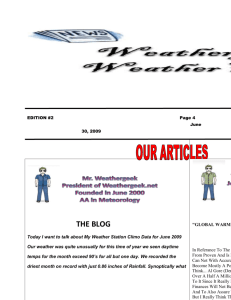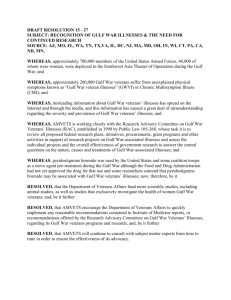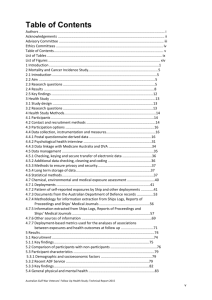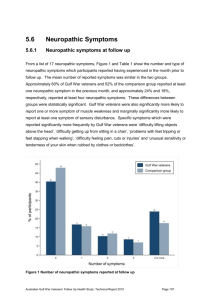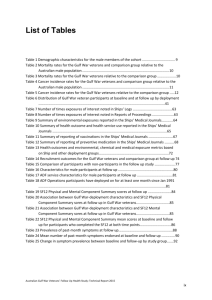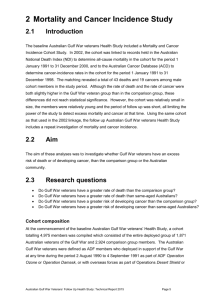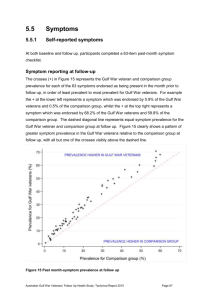Life Events
advertisement
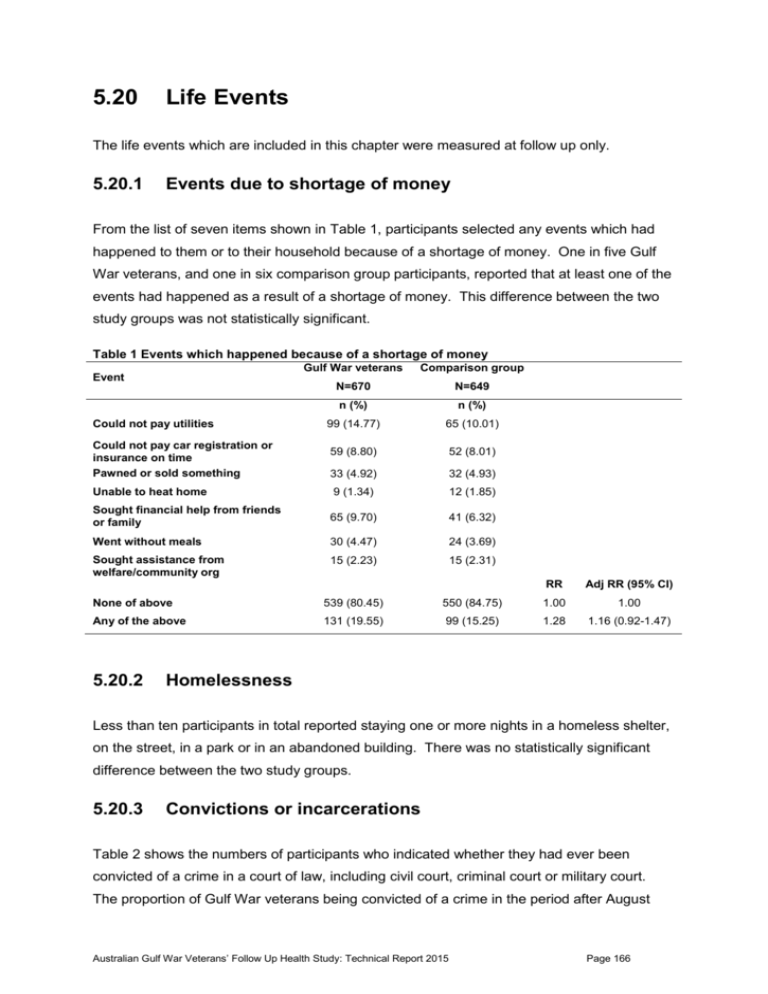
5.20 Life Events The life events which are included in this chapter were measured at follow up only. 5.20.1 Events due to shortage of money From the list of seven items shown in Table 1, participants selected any events which had happened to them or to their household because of a shortage of money. One in five Gulf War veterans, and one in six comparison group participants, reported that at least one of the events had happened as a result of a shortage of money. This difference between the two study groups was not statistically significant. Table 1 Events which happened because of a shortage of money Event Could not pay utilities Could not pay car registration or insurance on time Pawned or sold something Gulf War veterans Comparison group N=670 N=649 n (%) n (%) 99 (14.77) 65 (10.01) 59 (8.80) 52 (8.01) 33 (4.92) 32 (4.93) Unable to heat home 9 (1.34) 12 (1.85) Sought financial help from friends or family 65 (9.70) 41 (6.32) Went without meals 30 (4.47) 24 (3.69) Sought assistance from welfare/community org 15 (2.23) 15 (2.31) RR Adj RR (95% CI) None of above 539 (80.45) 550 (84.75) 1.00 1.00 Any of the above 131 (19.55) 99 (15.25) 1.28 1.16 (0.92-1.47) 5.20.2 Homelessness Less than ten participants in total reported staying one or more nights in a homeless shelter, on the street, in a park or in an abandoned building. There was no statistically significant difference between the two study groups. 5.20.3 Convictions or incarcerations Table 2 shows the numbers of participants who indicated whether they had ever been convicted of a crime in a court of law, including civil court, criminal court or military court. The proportion of Gulf War veterans being convicted of a crime in the period after August Australian Gulf War Veterans’ Follow Up Health Study: Technical Report 2015 Page 166 1990 was slightly larger than the proportion in the comparison group, and this difference just met statistical significance. The numbers before August 1990 were similar in the two groups. Table 2 Participants convicted of a crime in a court of law Convicted of a crime Gulf war veterans N=705 n (%) Comparison group N=669 n (%) RR Adj RR (95% CI) 127 (18.01) 93 (13.90) 1.30 1.24 (0.97-1.59) Before Aug 1990 69 (9.77) 64 (9.54) 1.02 1.08 (0.78-1.51) After Aug 1990 70 (9.89) 37 (5.51) 1.79 1.50 (1.01-2.20) Ever Fewer than five participants in total reported being sent to jail by a judge in a court, or spending time on remand awaiting a court hearing in the time since the Gulf War. The statistical difference between the groups was not calculated due to the small numbers. 5.20.4 Potentially traumatic events Exposure to potentially traumatic events (PTE’s) since January 1991 is shown in Table 3, ordered by frequency of reporting for Gulf War veterans. For the privacy of participants, individual PTEs which were reported by less than ten participants in total were grouped together and included under the heading “other”. More than half of the participants in both study groups reported at least one of the PTEs listed. The pattern of PTE exposure was similar between the two groups. Table 3 Potentially traumatic events since January 2001 Potentially traumatic event since January 2001 Gulf War veterans (N=695) n (%) Comparison group (N=657) n (%) RR Adj RR (95% CI) 126 (18.13) 120 (18.24) 0.99 0.96 (0.77-1.22) Did someone very close to you die unexpectedly; for example, they were killed in an accident, murdered, committed suicide, or had a fatal heart attack at a young age? 112 (16.14) 97 (14.72) 1.10 1.10 (0.85-1.41) Did you serve as a peacekeeper or relief worker in a war zone or in a place where there was ongoing terror of people because of political, ethnic, religious or other conflicts? 88 (12.68) 81 (12.29) 1.03 1.04 (0.77-1.41) Were you involved in a major natural disaster, like a devastating flood, hurricane or earthquake? 81 (11.67) 68 (10.32) 1.13 1.11 (0.80-1.53) Were you exposed to a toxic chemical or substance that could cause you serious harm? 79 (11.45) 64 (9.80) 1.17 1.07 (0.77-1.49) Did you have any other life- threatening accident, including on your job? 65 (9.37) 51 (7.79) 1.20 1.10 (0.77-1.59) Did you participate in combat, either as a 57 (8.21) 43 (6.54) 1.25 1.37 (0.91-2.05) Did you see someone being badly injured or killed, or unexpectedly see a dead body? Australian Gulf War Veterans’ Follow Up Health Study: Technical Report 2015 Page 167 Potentially traumatic event since January 2001 Gulf War veterans (N=695) n (%) Comparison group (N=657) n (%) RR Adj RR (95% CI) member of a military, or as a member of an organised non-military group? Did you have a life threatening illness? 55 (7.95) 46 (7.00) 1.14 1.14 (0.78-1.69) Did you have a son or daughter who had a life threatening illness or injury? 38 (5.47) 37 (5.61) 0.97 1.07 (0.68-1.70) Were you involved in a life threatening automobile accident? 32 (4.62) 32 (4.87) 0.95 0.81 (0.50-1.53) Were you in a man-made disaster, like a fire started by a cigarette, or a bomb explosion? 31 (4.47) 24 (3.65) 1.22 0.98 (0.57-1.69) Were you mugged, held up, or threatened with a weapon? 28 (4.04) 25 (3.80) 1.06 0.99 (0.56-1.72) Did you see atrocities or carnage such as mutilated bodies or mass killings? 28 (4.03) 20 (3.04) 1.32 1.25 (0.70-2.25) Were you an unarmed civilian in a place where there was a war, revolution, military coup or invasion? (By this we mean a civilian not directly involved in the armed conflict) 25 (3.60) 19 (2.89) 1.24 1.50 (0.79-2.85) Did you live as a civilian in a place where there was ongoing terror of civilians for political, ethnic, religious or other reasons? 19 (2.73) 24 (3.64) 0.75 0.89 (0.49-1.59) Did anyone very close to you have an extremely traumatic experience, like being kidnapped, tortured or raped? 14 (2.01) 15 (2.28) 0.88 0.82 (0.39-1.73) Other 87 (12.25) 70 (10.39 1.18 1.09 (0.81-1.49) None of the above 285 (40.89) 284 (43.10) 1.00 1.00 Any of the above 412 (59.11) 375 (56.90) 1.04 1.02 (0.93-1.12) 5.20.5 Key findings Gulf War veterans and comparison group participants were equally likely to have experienced financial difficulty which had led to events such as the inability to pay utilities, car registration or insurance on time, or the need to seek financial assistance from friends or family or welfare organisations. Events such as these were reported by 17% of all participants. Very small numbers of participants reported homelessness or incarcerations and there was no difference between the study groups on these measures. Gulf War veterans were very slightly more likely to have received a criminal conviction in the period since August 1990, which may be indicative of social dysfunction or maladaptive behaviours which are related to war deployment or connected to chronic morbidity. More than half of the participants in both study groups had experienced at least one potentially traumatic event. The pattern of exposure to potentially traumatic events was similar for the two groups. Australian Gulf War Veterans’ Follow Up Health Study: Technical Report 2015 Page 168

